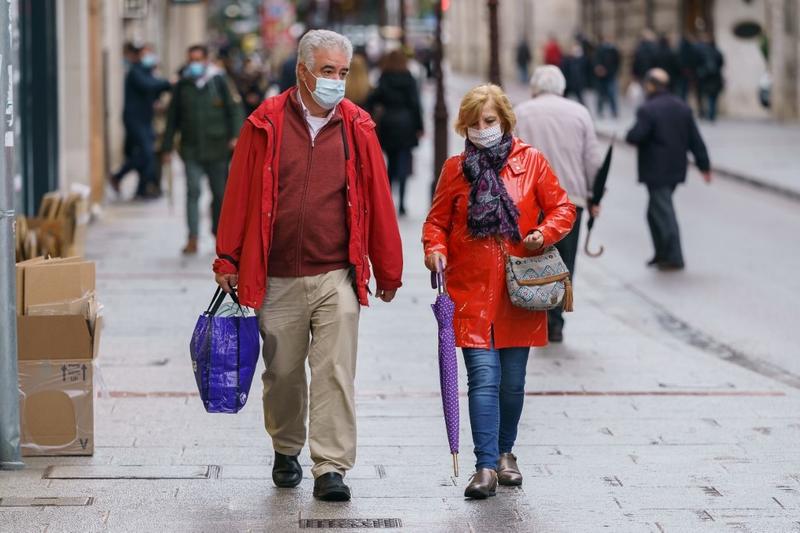 People wearing face masks walk in Burgos, northern Spain, on Oct 21, 2020. (PHOTO / AFP)
People wearing face masks walk in Burgos, northern Spain, on Oct 21, 2020. (PHOTO / AFP)
TALLINN / OTTAWA / MEXICO CITY / PANAMA CITY / LONDON / TBILISI / SAN FRANCISCO / GENEVA / PARIS / MADRID / LISBON / TRENCIN / BUENOS AIRES / SANTIAGO / BRASILIA / KIEV / PRAGUE / KIGALI / RABAT / ADDIS ABABA / MOSCOW / SOFIA / BUDAPEST / WARSAW / KIGALI - The northern Spanish region of Castilla and Leon ordered a shutdown of bars and restaurants on Tuesday and demanded tougher measures from the national government to defeat one of Europe’s worst outbreaks of the coronavirus.
Announcing the restrictions, which come into force on Nov. 6, regional leader Alfonso Fernandez Manueco described the situation as one of “maximum risk,” adding that his administration favoured stricter measures but was stymied by Spain’s current legal framework.
Under a six-month state of emergency declared last week, regional authorities have powers to declare curfews and shut down businesses, but they cannot impose home confinement without central government authorization.
With 1.2 million cases, Spain has the second highest caseload in Western Europe after France. The death toll stands at 36,257.
France
One Parisian is getting infected with COVID-19 every 30 seconds, while every 15 minutes there is a Parisian arriving in hospital as a result of the disease, Health Minister Olivier Veran said on Tuesday.
It’s urgent that France follow the lockdown to ease pressure on hospitals, Veran said.
The pressure is very strong on the hospitals, in the emergency rooms, in intensive care, in the public hospitals, the private hospitals, in the big cities, in the less urbanized region.
Olivier Veran, French health minister
“The pressure is very strong on the hospitals, in the emergency rooms, in intensive care, in the public hospitals, the private hospitals, in the big cities, in the less urbanized regions,” Veran said in an interview with RTL Radio. Last week, France transferred about 40 intensive-care patients from one region where hospitals were filling up to other parts of the country, he said, in anticipation of the situation worsening.
France's reported a record 52,518 new COVID-19 cases on Monday while the number of people hospitalized with the disease rose by more than a 1,000 for the fourth time in eight days.
The cumulative number of cases now totals 1,466,433 in France, the fifth-highest total in the world behind the United States, India, Brasil and Russia.
The number of hospitalizations has more than doubled in 12 days to stand at 25,784 now. The number of people in intensive care units (ICUs) has increased by 152, to 3,730, which is also a fourth-month high.
Meanwhile, the death toll rose by 416 to 37,435.
 Young students wearing face masks put on gloves as a precaution against the new coronavirus during class in Havana, Cuba, Nov 2, 2020. (RAMON ESPINOSA / AP)
Young students wearing face masks put on gloves as a precaution against the new coronavirus during class in Havana, Cuba, Nov 2, 2020. (RAMON ESPINOSA / AP)
Influenza risk
Experts from the World Health Organization (WHO) highlighted on Monday the risk of young children and pregnant women contracting the influenza virus during the COVID-19 pandemic, calling for strong surveillance and testing.
Maria Van Kerkhove, technical lead for WHO's health emergencies program, warned at a WHO press briefing that it's still unknown how the coming influenza season in the Northern Hemisphere is to unfold. However, strong surveillance systems for the illness are already in place and are still working even amid the pandemic. She recommended people at high risk for influenza to get vaccinated as COVID-19 rages on.
Janet Diaz, the WHO's clinical management lead, highlighted that young children and pregnant women are at risk of having severe diseases caused by influenza but not of those caused by COVID-19. Should anyone from the two groups of people show symptoms of acute respiratory infection, they need to be tested first before taking different treatment pathways.
Diaz also spoke on the differences in using corticosteroid to treat influenza and COVID-19. The drug is now used to treat COVID-19 and can reduce the mortality in patients suffering from severe and critical COVID-19. She highlighted, however, that there has been concern that corticosteroid can increase viral replication when used as a treatment for influenza.
ALSO READ: WHO leader pours cold water on herd immunity
WHO chief to be tested
Meanwhile, WHO Director-General Tedros Adhanom Ghebreyesus, who is self-isolating at home, will be tested for COVID-19 if he displays symptoms, Mike Ryan, the WHO's top emergencies expert, said.
"Our current protocols don't require that he be tested," Ryan said at the press briefing. "He is working at home...continuing to do his job in support of the world. His testing will be depending on the arrival of symptoms or otherwise."
Tedros said on Sunday that he had been identified as a contact of someone who tested positive for COVID-19, but added that he was feeling well and did not have any symptoms.
Europe situation
At the press briefing, Ryan also said that governments in Europe face a "very, very difficult situation" in controlling rising numbers of COVID-19 cases as their options are "limited" and their citizens grow weary with renewed restrictions on daily life.
READ MORE: Italy will tighten virus curbs, but holds back from lockdown
Global tally
Coronavirus cases worldwide surpassed 46.8 million while the global death toll exceeded 1.2 million, according to data compiled by Johns Hopkins University.
Africa tally
The number of confirmed cases recorded across the African continent has reached 1,794,507 while the death toll has risen to 43,176, the Africa Centers for Disease Control and Prevention (Africa CDC) said on Monday.
Argentina
Argentina could obtain 25 million doses of Russia's "Sputnik V" COVID-19 vaccine between December this year and January next year, President Alberto Fernandez told Russian media on Monday.
"They would be in a position to give us 10 million of each of the two doses (required). We can have them here in December, and in the first days of January we could have, they tell me, 15 million more doses," Fernandez said in an interview with Russian news agency Sputnik.
"By December we could ... begin vaccination," a development he described as "very important, because it would allow us to vaccinate vulnerable sectors in Argentina."
The price of the Russian vaccine would be "more or less average" compared with others, President Alberto Fernandez said in a government news release.
Despite the Argentine government's strict lockdown to curb the spread of the virus from mid-March, coronavirus cases are still on the rise. The South American country exceeded 1 million infections last month and more than 30,000 deaths.
Belgium
The number of COVID-19 patients in Belgian intensive-care units rose to a record 1,302, surpassing the first-wave peak of 1,285 on April 8.
Belgian hospitals have a regular capacity of about 2,000 ICU beds and are adding 300 in other units for COVID-19 patients requiring mild oxygen support.
Hospital admissions rose to 596 from 555 the day before. That remains well below the record 743 hospitalizations on Oct 28.
Brazil
Brazil reported 8,501 additional confirmed COVID-19 cases and 179 deaths in the past 24 hours, the health ministry said on Monday.
In total, the South American country has now registered 5,554,000 cases and 160,253 fatalities, according to ministry data, in the world's most fatal outbreak outside the United States.
Bulgaria
Bulgaria reported a record high 51 additional COVID-19 deaths for Monday, raising the death toll to 1,349, the Ministry of Health said Tuesday morning.
The number of confirmed cases rose by 2,427 to 56,496, the ministry said.
The number of patients in intensive care units was also at its highest, standing at 2,841, it added.
Prime Minister Boyko Borissov, who is recovering from COVID-19 at home, said the government isn’t planning a lockdown.
Canada
Some Canadian provinces are considering more stringent measures as the second wave of COVID-19 continues to surge in the country.
As of Monday afternoon, Canada has recorded a total of 239,143 COVID-19 cases and 10,202 deaths, according to CTV.
The latest national-level data showed that 2,771 new cases were reported daily on average over the past seven days, said the Public Health Agency of Canada.
The Ontario government is said to unveil a new tiered system for COVID-19 restrictions that will give municipalities and public health units a clear criteria as to when to impose lockdowns and closures.
Meanwhile, the Manitoba government said it was giving "serious consideration" to imposing a curfew to stop people from gathering in large groups.
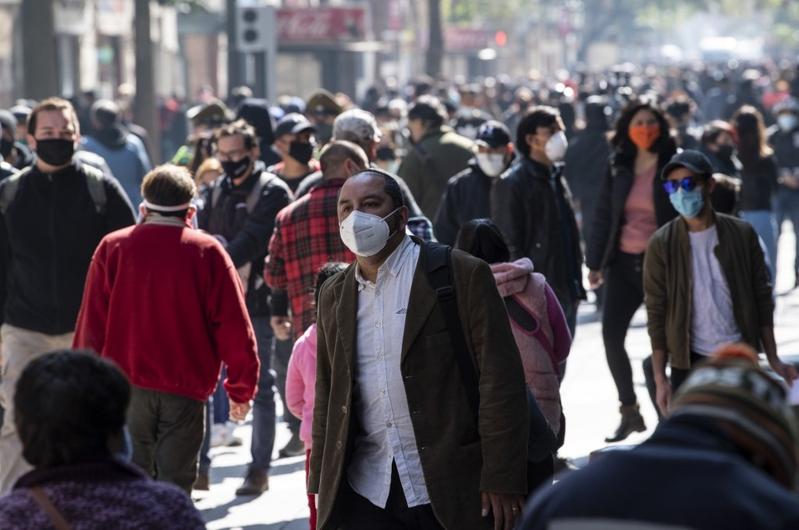 People wear face masks while walking along a pedestrian promenade in downtown Santiago, following the easing of lockdown restrictions amid the pandemic, on Aug 17, 2020. (PHOTO / AFP)
People wear face masks while walking along a pedestrian promenade in downtown Santiago, following the easing of lockdown restrictions amid the pandemic, on Aug 17, 2020. (PHOTO / AFP)
Chile
Chile's Health Minister Enrique Paris on Monday urged the public to practice social distancing and other safety measures to prevent a second wave of the COVID-19 pandemic , as the country marked more than half a million confirmed cases.
The Ministry of Health said it has registered a total of 513,188 confirmed cases since the start of the outbreak in Chile. In the last 24 hours, 1,314 fresh infections were reported, while 55 additional deaths were registered to take the death toll to 14,302.
Czech Republic
The Czech Republic reported 9,241 new coronavirus cases and 225 additional deaths on Monday, data from the health ministry showed on Tuesday.
The tally of infections rose to 350,896 in the nation of 10.7 million people, while the death toll stood at 3,654.
The increase in deaths was spread over several days because of reporting issues, however, and was not limited to the past 24 hours.
Estonia
The Estonian Health Board urged the public on Monday to behave responsibly to curb the spread of COVID-19.
According to the Estonian Public Broadcasting, the health board said that mass testing was not required at the moment in the country, adding that attention should be paid to curbing the spread of the coronavirus in and around the capital.
Estonia's 14-day infection rate on Monday rose to 72.31 per 100,000 inhabitants against 68.28 on Sunday.
In total, 264,808 COVID-19 tests has been conducted in the country since the start of March, with 5,046 (1.9 percent) returning positive. The disease has claimed the lives of 73 people, according to statistics from the health board.
Georgia
Georgia reported 1,943 new COVID-19 cases on Tuesday, bringing the national count to 44,522.
A total of 650 new cases were confirmed in the capital city of Tbilisi, the National Center for Disease Control and Public Health said.
As of Tuesday, 28,633 patients have recovered, while 362 others have died, said the center.
To further prevent the spread of the coronavirus, the Georgian government has ordered all restaurants in the country to stop service at 22:00 (1800 GMT) each day from this Tuesday.
Meanwhile, starting from Wednesday, wearing face masks in open public areas will become mandatory around the country, according to the government.
Georgian Prime Minister Giorgi Gakharia tested positive for COVID-19 on Monday.
According to the prime minister's press office, Gakharia feels well and will stay home to fight the disease.
The prime minister on Sunday announced via Facebook that he had gone into self-isolation after one of his security guards tested positive for the coronavirus the day before.
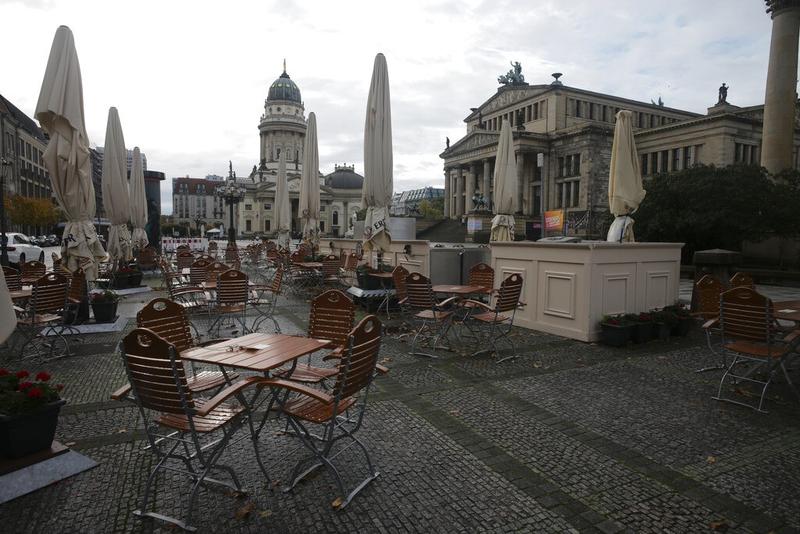 The chairs and tables of a closed restaurant stand on the deserted Gendarmenmarkt, a tourist highlight in Berlin, Germany, on Nov 2, 2020, as new measures to stop the spread of the coronavirus come into force. (MARKUS SCHREIBER / AP)
The chairs and tables of a closed restaurant stand on the deserted Gendarmenmarkt, a tourist highlight in Berlin, Germany, on Nov 2, 2020, as new measures to stop the spread of the coronavirus come into force. (MARKUS SCHREIBER / AP)
Germany
Germany is in a decisive phase of the coronavirus pandemic, Health Minister Jens Spahn said on Tuesday, urging a national effort to slow the spread of the virus a day after month-long lockdown measures took effect.
“This pandemic is really a mammoth task for the government and for every individual in society,” Spahn, who has just recovered from his own coronavirus infection, told a news conference.
“For eight months we have been working together to stem the virus. According to everything we know, we have not yet reached the peak of this task. We are in a decisive phase. The situation is serious. It is a national effort.”
Germany imposed the lockdown, which includes the closure of restaurants, gyms and theatres, to prevent its healthcare system from getting overwhelmed.
Lars Schaade, deputy head of the Robert Koch Institute (RKI) for infectious diseases, said Germany would have been facing more than 400,000 new daily cases by Christmas if it had not imposed the new measures.
RKI data published on Tuesday showed the number of confirmed coronavirus cases in Germany rose by 15,352 to 560,379 in a day while the reported death toll rose by 131 to 10,661.
The health minister defended on Tuesday his decision to purchase additional supplies of remdesivir for treating COVID-19, saying Gilead’s antiviral drug was useful especially early in the course of the disease.
“Because it makes sense in some situations and because the need has risen enormously we have procured additional supplies of remdesivir,” Jens Spahn told a news conference.
Italy
The Italian government is readying new relief funding of at least 1.5 billion euros (US$1.8 billion) for businesses affected by a coming wave of new shutdowns, people familiar with the matter said.
Italy’s latest decree, which could be announced by Prime Minister Giuseppe Conte as soon as Tuesday, will lead to closures of a wide range of businesses in the country’s hardest-hit regions, including much of the industrial north, according to the people, who asked not to be named discussing confidential deliberations.
All non-essential commercial activities will be closed in the regions of Lombardy surrounding Milan, Piedmont, whose capital is Turin, and Calabria to the south, the people said.
Mexico
Mexico's health ministry reported on Monday 3,763 additional cases of the novel coronavirus and 205 more deaths in the country, bringing the official number of cases to 933,155 and the death toll to 92,100.
Morocco
Morocco reported on Monday 2,526 new COVID-19 cases, taking the country's infection tally to 225,070.
The number of recoveries increased by 2,788 to 187,101 while the death toll rose by 64 to 3,826, the Ministry of Health said in a statement.
Panama
Panama's President Laurentino Cortizo has began self-isolating after a close co-worker tested positive for the novel coronavirus, the presidency said on Monday, without revealing the name or position of the person who was infected.
Cortizo has taken two coronavirus tests, which were both negative, but will continue isolating "until he repeats the tests in a few days," the presidency said on Twitter.
Poland
The total number of people infected with COVID-19 in Poland passed the 400,000 mark on Tuesday, the health ministry said, after the figures doubled in less than two weeks.
The ministry reported 19,364 new cases on Tuesday, below the record high of 21,897 recorded last Saturday.
Since the beginning of the pandemic, Poland has recorded a total of 414,844 confirmed cases and 6,102, the ministry said on its Twitter account.
Portugal
Portuguese President Marcelo Rebelo de Sousa said on Monday he was pondering declaring a state of emergency as a preventive measure to fight the spread of the coronavirus at a time when infections are soaring.
Hours after Prime Minister Antonio Costa asked the president to declare the state of emergency, Rebelo de Sousa said in an interview with RTP Television he was considering the request, explaining it would include specific measures to combat the pandemic but not a "total or nearly total" lockdown.
A state of emergency would clear the way for compulsory measures such as restrictions on movement of people but only if and when needed.
Portugal, with just over 10 million people, has recorded a comparatively low 146,847 cases and 2,590 deaths from COVID-19. But daily new cases reached 4,656 on Friday, the highest since the pandemic began. Testing for the virus has also increased.
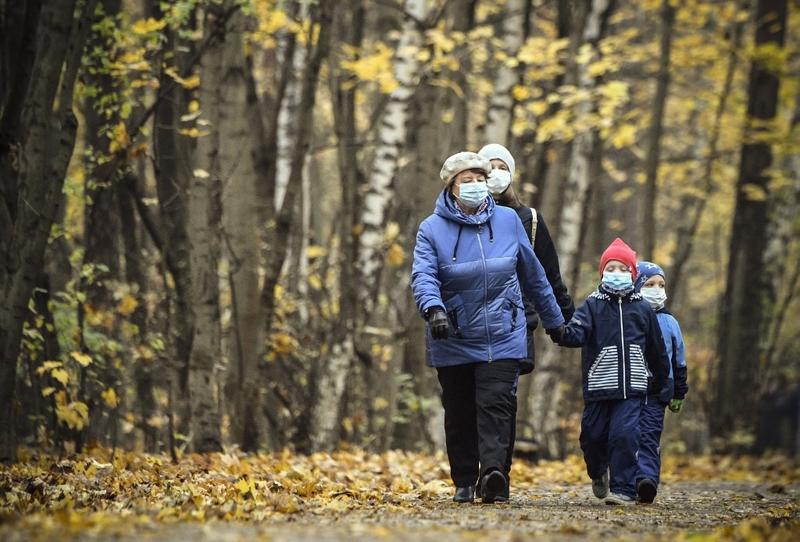 A family wearing face masks walks in a park in Moscow, Russia, on Nov 2, 2020. (PHOTO / AFP)
A family wearing face masks walks in a park in Moscow, Russia, on Nov 2, 2020. (PHOTO / AFP)
Russia
Russia reported 18,648 new coronavirus cases on Tuesday, including 5,150 in Moscow, pushing the national tally to 1,673,686 since the pandemic began.
Authorities said 355 people had died in the last 24 hours, taking the death toll to 28,828.
Rwanda
Senior students in all Rwandan primary and secondary schools returned to schools on Monday after more than seven months of class suspension due to the COVID-19 pandemic.
Technical and Vocational Education and Training (TVET) and Teacher Training Colleges (TTC) also reopened on the same day.
Students of the fifth and six grades of primary schools, and the third, fifth and sixth grades of secondary schools as well as those of level three, four and five students of TVET resume second-term studies in schools in November, while students of all levels in TTC have begun in-person lessons, according to the Ministry of Education's calendar issued in October.
Primary Four pupils and students in secondary One, Two and Four are expected to resume in-person classes on Nov 23. Students of primary one to primary three and nursery will have to wait until at least January next year as they continue online learning.
Slovakia
More than 3.6 million Slovaks - two thirds of the population - took part in a nationwide coronavirus testing program over the weekend, Prime Minister Igor Matovic said on Monday.
A total of 38,359 people, or 1.06 percent of those who took part, tested positive and must quarantine, Matovic said at a news conference.
The weekend's results showed that infection rates had dropped substantially in four districts where a pilot round was held a week ago, he added.
Children up to the age of 10 were exempt and testing was voluntary for others - but people who chose not to take part must go into quarantine.
Serbia
Serbians defying the order to wear face masks will soon have to pay 5,000 dinars (US$50) on the spot if caught by the police.
The government hopes that tougher penalties, including for bars and nightclubs that defy coronavirus restrictions, will help avoid a lockdown, as the economy conracted 1.3 percent, more than expected, in the third quarter.
READ MORE: Europe reels under second wave of COVID-19
The northern region of Asturias asked for permission on Monday from the Spanish government to impose a two-week home lockdown as the pressure on health services reached breaking point.
However, Spain's health minister Salvador Illa refused the region permission to impose a full lockdown, saying authorities in Asturias should wait to see the effects of a curfew and other restrictions imposed under the state of emergency.
Switzerland
Restaurants and shopkeepers in Geneva prepared to close in line with new COVID-19 measures on Monday as its main hospital fills up and prepares to begin airlifting out patients to less burdened cantons.
Gatherings have been limited to five people from 1800 GMT although some exceptions apply and, unlike the spring, schools remain open.
The canton of Neuchatel will adopt similar measures on Wednesday.
UK
Britain will launch a COVID-19 mass testing pilot scheme in Liverpool on Friday, offering everyone in the city tests whether or not they have symptoms, in an attempt to find a better way to use testing to limit the spread of the coronavirus.
Some 2,000 military personnel will be deployed in the city from Thursday to help deliver the tests.
British PM Johnson defended his decision to impose a second lockdown in England, arguing now was the time to prevent a "medical and moral disaster"
Prime Minister Boris Johnson said Monday that dependent on the pilot's success, millions of the new rapid tests could be distributed elsewhere in the country before Christmas to help local authorities drive down transmission in their areas.
Meanwhile, Johnson, while speaking to the House of Commons, defended his decision to impose a second lockdown in England, arguing now was the time to prevent a "medical and moral disaster".
The United Kingdom recorded 18,950 new COVID-19 cases and another 136 deaths, daily government statistics showed on Monday.
The ambulance service in northwest England, one of the areas worst-hit by COVID-19, declared a major incident on Monday over an exceptionally high volume of calls, especially in the Greater Manchester area.
Declaring a major incident is a formal step allowing managers to take measures such as calling in extra staff.
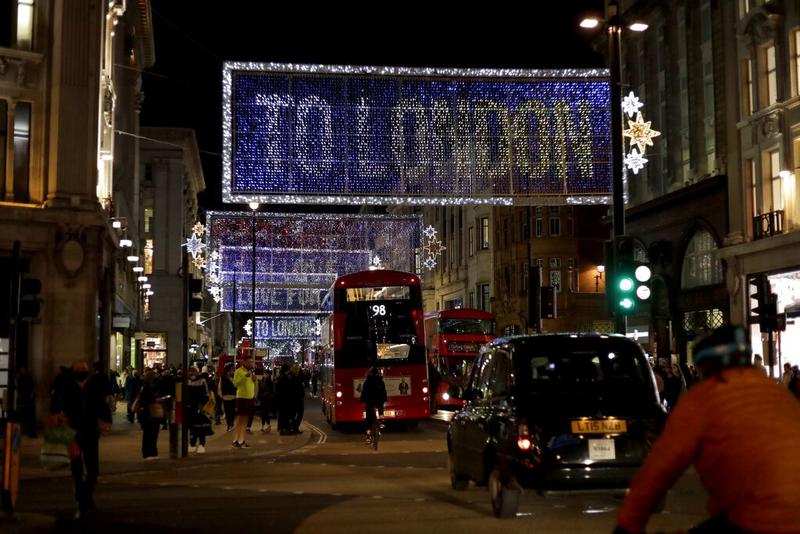 A busy Oxford Street with Christmas lighting is seen in London, Britain, in the evening of Nov 2, 2020, ahead of lockdown in England which begins on Nov 5. (MATT DUNHAM / AP)
A busy Oxford Street with Christmas lighting is seen in London, Britain, in the evening of Nov 2, 2020, ahead of lockdown in England which begins on Nov 5. (MATT DUNHAM / AP)
Ukraine
The coronavirus situation in Ukraine is close to catastrophic and the nation must prepare for the worst, Health Minister Maksym Stepanov said on Tuesday.
Ukraine registered a record 8,899 new COVID-19 cases in the past 24 hours, the ministry said, up from the Oct 30 high of 8,312. Total infections stood at 411,093 by Tuesday with 7,532 deaths.
"The situation quickly turns from difficult to catastrophic. We need to prepare for the inevitable - it is impossible to easily pass the second wave," Stepanov told the parliament.
"If Ukrainians continue to severely disregard safety rules, we will not avoid a catastrophe. The hardest is ahead," he added.
He had warned that the resources of the medical system would run out if the number of daily cases exceeds 20,000.
US
The coronavirus continues to spread at alarming rates throughout the US Midwest with record numbers of infections recorded across the region over the weekend.
Minnesota Department of Health Commissioner Jan Malcolm said Monday her state recorded 2,954 cases, while Wisconsin reported 3,433 fresh infections. Iowa’s 14-day positivity rate reached 14.5 percent, more than twice the national average, according to the Centers for Disease Control and Prevention.
New York Governor Andrew Cuomo said he won’t enter a data-sharing agreement with the federal government for its vaccine program, saying that the agreement endangers undocumented immigrants
Meanwhile, more than half of a 49-resident work-release facility in Seattle, Washington, have tested positive for the novel coronavirus, The Seattle Times reported on Monday. The outbreak at Bishop Lewis Work Release on Seattle's First Hill surged from two cases identified on Oct 16 to 28 as of Oct 30, according to the Washington State Department of Corrections (DOC).
Separately, virus hospitalizations swelled in Houston and four other Texas cities as conditions deteriorated in the Lone Star state’s worst hot spots. New Jersey, with six straight days of more than 1,000 hospitalizations, is seeing an increase in the sickest patients.
ALSO READ: COVID-19 hits US university budgets
In Massachusetts, Governor Charlie Baker ordered residents to stay home between 10 pm and 5 am except for essential activities, and will require many businesses to shut starting at 9:30 pm. Face coverings will now be required in all public places, even if social distancing can be maintained, and indoor gatherings at private residences are limited to 10 people and must disperse by 9:30 pm.
In another development, New York Governor Andrew Cuomo said he won’t enter a data-sharing agreement with the federal government for its vaccine program, saying that the agreement endangers undocumented immigrants.
CureVac vaccine
A coronavirus vaccine under development from CureVac NVshowed a good immune response in early trials, validating the biotech company’s research into messenger RNA’s ability to train the body’s defenses. The most promising vaccine dose produced an immune response comparable to that found in recovered patients in an early-stage test on more than 250 volunteers, the German company said Monday.
Chief Executive Officer Franz-Werner Haas said advanced clinical trials are on track to start by year-end.
COVID-19 immunity
A small but key UK study has found that "cellular immunity" to the SARS-CoV-2 virus is present after six months in people who had mild or asymptomatic COVID-19 - suggesting they might have some level of protection for at least that time.
The research on 100 non-hospitalized COVID-19 patients shows that all had T-cell responses against a range of the coronavirus’ proteins, including the spike protein used as a marker in many vaccine studies, after half a year. Those who experienced symptoms had levels that were at least 50 percent higher than those who didn’t.
Scientists presenting the findings said the findings were "reassuring" but did not mean people cannot in rare cases be infected twice with the disease.
Experts not directly involved with the study, which has not yet been peer-reviewed by other experts but was published online on bioRxiv, said its findings were important and would add to a growing body of knowledge about potential protective immunity to COVID-19.
Hungary
Hungary registered 3,989 new COVID-19 cases on Tuesday, a fresh daily record since the outbreak of the epidemic in the country, according to the government's coronavirus information website.
Figures from the website showed that the total number of confirmed cases in Hungary stood at 86,769 on Tuesday, with 20,856 recoveries and 1,973 fatalities. Currently, 4,767 COVID-19 patients are being treated in hospital, 348 of them on ventilators.
The previous daily record of new COVID-19 cases was registered on Oct. 31, when Hungary added 3,908 cases in 24 hours.
Sweden
COVID-19 cases are increasing fast in Sweden, Prime Minister Stefan Lofven said on Tuesday as he announced stricter recommendations for another three regions.
“We have a very serious situation,” Lofven told a news conference. “More and more intensive care beds are now being used to treat COVID patients. The respite we got this summer is over.”
He also said parties at restaurants would be limited to eight people.
Sweden has seen a surge in new infections in recent weeks, surpassing peaks set in the spring, though levels are not as high as in countries like Belgium, Spain and France relative to the size of the population.


